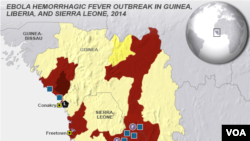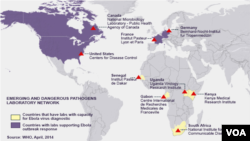The death of an Ebola-infected airline passenger in Nigeria has tipped off fears that the illness could spread across the airways to Europe, Asia and the Americas.
At least one U.S. lawmaker proposed to ban travelers from Ebola-impacted countries from entering the United States. So far, the proposal has seen little traction among U.S. agencies, though federal health officials on Thursday advised Americans to avoid nonessential travel to the West African countries Guinea, Sierra Leone and Liberia because of the outbreak.
The Centers for Disease Control and Prevention’s “Level 3” warning talks of “high risk” to travelers and is issued mostly in dire events such as the outbreak of the SARS disease.
Still, international travel organizations and health officials are downplaying the threat of a global pandemic spreading through air travel, saying transmission of the virus does not happen through the air. They say because of the nature of the virus and its method of spreading, there’s little reason to panic.
Ebola is a hard virus to catch, in spite of the alarming numbers coming out of West Africa. It is transmitted either by direct contact with the bodily fluids of an infected person or by indirect contact – such as touching soiled bed sheets, clothing or contaminated surfaces.
“The primary concern would be transmission through body fluids – sneezing, sputum, blood,” said Russell B. Rayman, former executive director of the Aerospace Medical Association (ASMA).
Any body fluid could transmit the virus, "so that is definitely a concern," he said. "And it’s particularly a concern when you are talking in terms of proximity, that is, a person who has this illness being close to somebody who does not have the illness. That’s true of any most infectious diseases.”
So far, ASMA hasn’t taken any official position on Ebola, Rayman said.
He cautioned against overreacting.
“There is always the possibility of going too a little too far one way or another, because there are other factors involved besides the facts themselves,” he said. “There may be political factors involved. There could be economic factors. At this stage of the game, I would just tend to urge all agencies and individuals to approach this thing with a clear mind and to make decisions based on facts, good common sense and good clinical judgment.”
The International Air Transport Association (IATA), the organization that sets guidelines for the airline industry, also is taking a cautious approach.
“We are concerned in the sense that it’s an important issue that needs to be dealt with,” said Claude Thibeault, the association's medical adviser, “but we are not concerned that this is going to spread like wildfire across the planet right now.”
IATA’s Medical Advisory Group, which draws on experts from all over the globe, has drafted guidelines to help airline crews in cases where a passenger may be infected with Ebola or any other communicable disease. These guidelines include lists of symptoms to look for, basic procedures on caring for ill passengers and specific steps for sanitizing surfaces and handling waste.
Transport officials say they work closely with the World Health Organization (WHO), which is not recommending any travel, border or trade restrictions at this time. But that hasn’t curbed fear or prevented West African states from taking extra precautions of their own.
The Nigeria Civil Aviation Authority (NCA) this week banned flights by Asky, the Togo-based airline that flew the Liberian passenger infected with Ebola into Lagos, where he later died.
And WHO said on Thursday that a medical sample taken from the Liberian man had not yet been sent for testing at its facilities in Senegal because courier companies have refused to transport it.
Derek Gatherer of Britain's Lancaster University, an expert in viruses who has been tracking the West Africa outbreak, told Reuters there is greater risk of transmission by land than through air travel.
"It's one of the reasons why we get this churn of infections," he said of cross-border transmissions.
Still, in most of the identified cases, victims are close to death likely too ill to travel, said Bruce Hirsch, an infectious diseases expert at North Shore University Hospital in New York.
"It is possible, of course, for a person to think he might just be coming down with the flu, and to get onto transport and then develop more critical illness,” he told Reuters. “ That's one of the things we are concerned about.”
But, Hirsch said: "The risk [of Ebola spreading to Europe or the United States] is not zero, but it is very small."
Reuters information contributed to this report.















